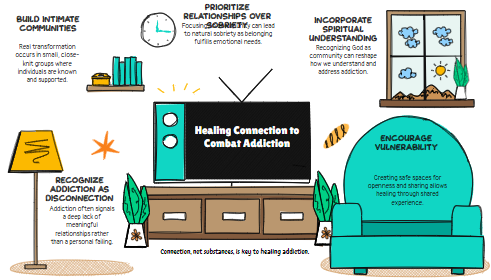
The Healing Power of True Community
The Healing Power of True Community
People break before substances take. Connection heals what isolation reveals. Our deepest wounds demand more than chemical solutions.
We've misdiagnosed addiction for generations. We've treated it as moral weakness, criminal behavior, or simply bad choices. But what if addiction is actually a flashing warning light on the dashboard of our collective soul? What if it signals not personal failure but a profound disconnection from what makes us human?
The evidence grows stronger each year. Addiction flourishes not primarily because substances are available but because meaningful connection isn't. The opposite of addiction isn't sobriety. It's relationship.
When Disconnection Becomes Our Default
Our modern world excels at connecting devices while disconnecting souls. We share more content yet experience less communion. We collect followers yet feel increasingly alone. The digital age promised connection but delivered contact without presence, information without intimacy.
This disconnection creates the perfect conditions for addiction to flourish. When we lack authentic community, we seek synthetic substitutes. The temporary relief of substances becomes attractive when permanent belonging feels unattainable.
Addiction then becomes rational behavior in an irrational world. It makes perfect sense to numb unbearable pain when no one is present to help carry it. The substance isn't the problem. It's the solution to a deeper problem: our hunger for connection in a fragmented world.
Jesus and the Counterintuitive Community
Jesus understood human connection better than we sometimes recognize. While we remember his massive crowds, his actual ministry strategy reveals something surprising. He invested most deeply in a small community of twelve ordinary people.
This wasn't accidental. Jesus modeled what neuroscience now confirms: transformation happens best in small, intimate groups where we are fully known. While he could draw thousands, Jesus recognized the limitations of the crowd experience. Real change happens in circles, not rows.
His ministry balanced the inspirational power of large gatherings with the transformational power of small communities. The crowds heard his message, but the disciples internalized his method. They experienced healing through belonging before they offered healing to others.
This pattern offers profound insight for addressing addiction. Recovery programs that work best don't just focus on substance management but on creating genuine community. They understand what Jesus demonstrated: healing happens in the context of belonging.
Trinity as Divine Community
The foundation for this understanding of community goes deeper than pragmatic effectiveness. It touches the very nature of God. The Trinity reveals God not as isolated power but as eternal, perfect community.
Father, Son, and Spirit exist in what theologians call perichoresis, a divine dance of mutual indwelling and perfect love. God doesn't just create community; God is community. The love-fueled relationship within the Godhead provides the blueprint for human connection.
This Trinitarian understanding transforms how we view both addiction and recovery. If we are created in the image of a God who exists as perfect community, then our need for connection isn't weakness. It's design. Our hunger for belonging isn't pathology. It's theology.
When we understand God this way, we recognize that our disconnection isn't just socially unfortunate. It's spiritually unsustainable. We were never meant to function as isolated individuals. We were designed to exist in life-giving community that reflects the very nature of our Creator.
Building Healing Communities
What might our approach to addiction look like if we truly embraced this understanding? First, we would stop seeing addiction primarily as a substance problem and recognize it as a connection problem. The question shifts from "Why the addiction?" to "Why the pain? Why the disconnection?"
Second, we would design recovery around restoring healthy community, not just removing unhealthy substances. Sobriety becomes not the goal but a byproduct of something more fundamental: belonging.
Third, our faith communities would recognize their unique potential as healing agents. Churches functioning as authentic ekklesia (the called-out community) offer something treatment centers alone cannot: permanent belonging within a larger story of redemption.
The most effective model combines professional intervention with communal integration. Clinical expertise addresses biological realities while community addresses relational needs. Neither alone is sufficient.
From Information to Transformation
Our greatest challenge isn't knowledge but implementation. We know disconnection drives addiction. We know Jesus modeled small-group transformation. We know the Trinity reveals God as community. But knowing these truths doesn't automatically create healing communities.
The path forward requires intentional action. It means creating spaces where people are fully known yet fully loved. Where masks come off and mercy comes in. Where weakness isn't hidden but held.
This kind of community doesn't happen accidentally. It requires vulnerability from leaders, commitment from members, and patience from everyone. It means prioritizing depth over breadth, quality over quantity.
The healing power of true community isn't just theological theory. It's practical reality. When we create spaces that reflect the Trinitarian dance of love, we offer the disconnected world what it desperately needs: a place to belong before it believes, a community that heals before it demands.
Our addiction crisis won't be solved through better information or stronger willpower. It will be healed through stronger connections. The answer isn't found in new substances or new strategies but in ancient wisdom: we were made for each other, by a God who exists in eternal community.
This is our hope and our challenge. To create communities that heal by reflecting the God who designed us for connection. To recognize that in addressing addiction, our most powerful medicine isn't found in a pill but in a people.
